US Consumer Confidence
August 2, 2023

The Conference Board Consumer Confidence Index rose again in July to 117.0 (1985=100), up from 110.1 in June. The Present Situation Index—based on consumers’ assessment of current business and labor market conditions—improved to 160.0 (1985=100) from 155.3 last month. The Expectations Index—based on consumers’ short-term outlook for income, business, and labor market conditions—improved to 88.3 (1985=100) from 80.0 in June. Importantly, Expectations climbed well above 80—the level that historically signals a recession within the next year. Despite rising interest rates, consumers are more upbeat, likely reflecting lower inflation and a tight labor market. Although consumers are less convinced of a recession ahead, we still anticipate one likely before yearend.
“Consumer confidence rose in July 2023 to its highest level since July 2021, reflecting pops in both current conditions and expectations,” said Dana Peterson, Chief Economist at The Conference Board. “Headline confidence appears to have broken out of the sideways trend that prevailed for much of the last year. Greater confidence was evident across all age groups, and among both consumers earning incomes less than $50,000 and those making more than $100,000.”
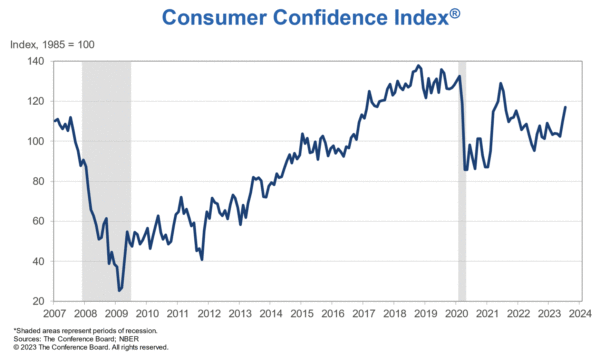
Peterson added: “Assessments of the present situation rose in July on brighter views of employment conditions, where the spread between consumers saying jobs are ‘plentiful’ versus ‘hard to get’ widened further. This likely reflects upbeat feelings about a labor market that continues to outperform. When asked about current family financial conditions (a measure not included in calculating the Present Situation Index), the share of respondents citing a ‘good’ situation rose, and those citing ‘bad’ conditions fell, signaling still-healthy family finances. This might reflect softening inflation and continued income support from employment.
“Expectations for the next six months improved materially, reflecting greater confidence about future business conditions and job availability. This likely reveals consumers’ belief that labor market conditions will remain favorable. Expectations for future incomes ticked down slightly, a potential reflection of slower wage growth compared to a year ago. The measure of expected family financial situation, six months hence (not included in the Expectations Index) also softened somewhat in July—despite further decline in the 12-month forward inflation expectations gauge.
“The proportion of consumers saying recession is “somewhat” or “very likely” to occur ticked up in July, contrary to the Expectations Index spiking this month above the threshold of 80. Still, recession expectations remained below their recent peak, suggesting fears of a recession have eased relative to earlier this year.
“In our periodic survey of services, consumers continued to report intentions to spend less on discretionary services—including travel, recreation, and gambling—going forward. By contrast, they anticipate spending more in the months ahead on necessary services like health care, as well as cheaper services like streaming from home.”
Present Situation
Consumers’ assessment of current business conditions was slightly less optimistic in July.
- 21.9% of consumers said business conditions were “good,” down from 23.4% last month.
- 15.2% said business conditions were “bad,” essentially unchanged from 15.3%.
However, consumers’ appraisal of the labor market improved.
- 46.9% of consumers said jobs were “plentiful,” up from 45.4%.
- 9.7% of consumers said jobs were “hard to get,” much lower than 12.6% last month.
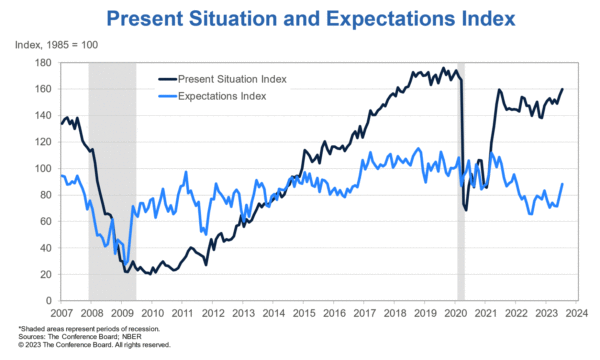
Expectations Six Months Hence
Consumers were more optimistic about the short-term business conditions outlook in July.
- 17.1% of consumers expect business conditions to improve, up from 14.6%.
- Meanwhile, 14.0% expect business conditions to worsen, down from 17.7% in June.
Consumers’ assessment about the short-term labor market outlook wasmore favorable.
- 16.4% of consumers expect more jobs to be available, up from 15.4%.
- Moreover, 14.8% anticipate fewer jobs, down from 16.7%.
Consumers’ short-term income prospects became more tempered in July.
- While 16.3% of consumers expect their incomes to increase, down from 18.6% last month,
- Only 9.7% expect their incomes will decrease, down from 11.8% in June.
Consumers’ assessment of their Family’s Current Financial Situation signals still-healthy family finances in July.
- 31.6% of consumers say their current family financial situation is “good,” up from 28.8% in June.
- 17.6% say their current family finances are “bad,” down from 18.6%.
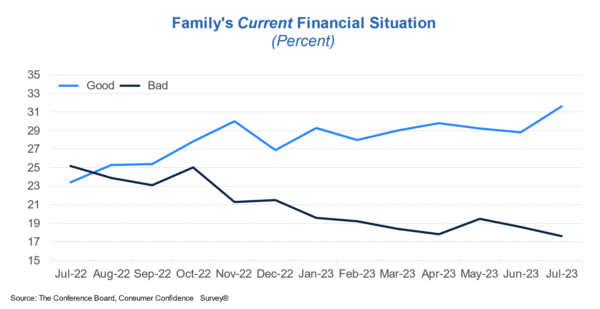
Consumers’ assessment of their Family’s Expected Financial Situation, Six Months Hence softened in July.
- 31.1% of consumers expect their family finances to be “better,” down from 31.9% in June.
- 13.6% expect their family finances to be “worse,” up from 13.2%.
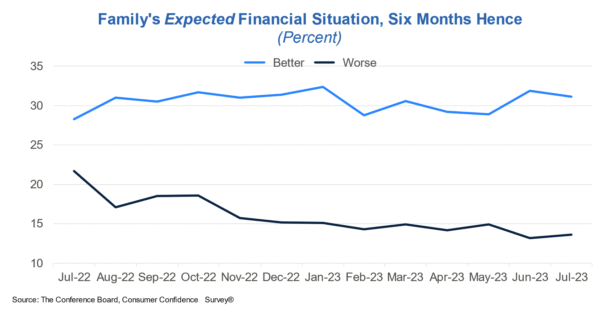
Consumers’ Perceived Likelihood of a US Recession over the Next 12 Months ticked up in July, but remained below the recent peak earlier in the year.
- 70.6% of consumers say a recession is “somewhat” or “very likely,” up from 69.9% in June.
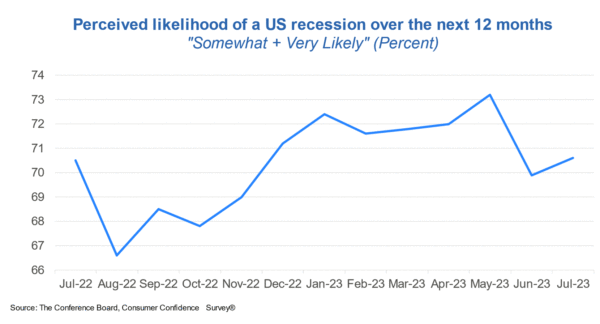
Expected Spending on Services, Next Six Months (July 2023 Survey)
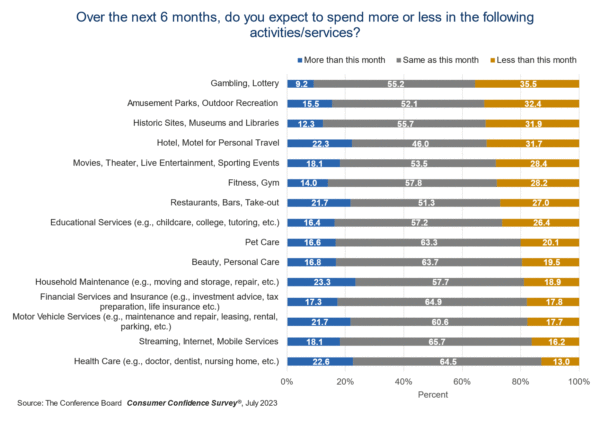
The monthly Consumer Confidence Survey®, based on an online sample, is conducted for The Conference Board by Toluna, a technology company that delivers real-time consumer insights and market research through its innovative technology, expertise, and panel of over 36 million consumers. The cutoff date for the preliminary results was July 19.
Source: July 2023 Consumer Confidence Survey®




























